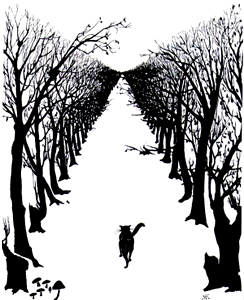"Hrothgar's
Speech"

He lives in plenty: illness and age in no way grieve him, neither does dread care darken his heart, nor does enmity bare sword-hate, for the whole world turns to his will --he knows nothing worse-- Until his portion of pride increases and swells within him; then the watcher sleeps, the soul's guardian; that sleep is too sound, bound in its own cares, and the slayer most near whose bow shoots treacherously. . . he cannot protect himself. . . angry-hearted he covets. . . and then he forgets and regards not his destiny because of what God, wielder of heaven, has given him . . . In the end it happens in turn that the loaned body weakens, falls doomed; another takes the earl's ancient treasure, one who recklessly gives precious gifts does not fearfully guard them (49).
|
|
|
|
|
|
|
Where has
the horse gone? |
|
| The speakers in both
passages are the only survivors of their battles. They are both completely
alone, and left wandering the Earth with nothing. Although brave warriors
are always surrounded by comrades, they have to realize that there will
be a time in their lives when they will be completely alone. When this
time comes, they must be ready to face their true selves and cannot hide
behind insignificant material wealth. This is what King Hrothgar is warning Beowulf against when he tells him not to allow his pride to increase and swell. Beowulf is a good person but could be changed by allowing his pride to overcome him. All people must eventually face death, and this they must do alone. By realizing this, one can see that Beowulf has parallels with the warrior in the Old English poem, "The Wanderer," and the shepherd of the rings in "The Last Survivor's Speech." All three characters are faced with solitude when they are left to die alone. Beowulf indirectly alludes to this loneliness when he says that God "has guided the man without friends . . ." (Norton 48) and he is talking about himself. |
|
 To
Summary
To
Summary  Home
Home